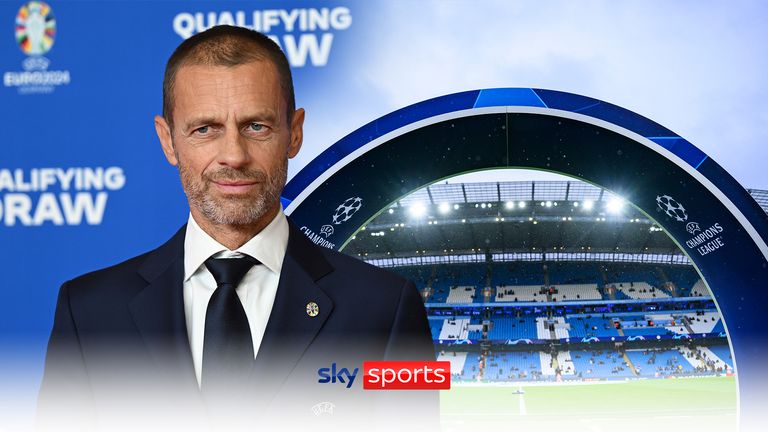In theory, there could be seven Premier League clubs in the Champions League next season, although it would require for Premier League clubs to win this season’s Champions League and Europa League while both finishing outside the top five

Roll up, roll up: the Greatest Show on Earth is back – and following a thrilling opening weekend to the new Premier League season, supporters are still coming to terms with what’s different this campaign.
Players, managers and supporters are getting used to the new protocols on time-wasting, dissent and the ‘higher bar’ when it comes to the implementation of VAR – but history could also be made come the start of the 2024/25 season.
For the very first time, five Premier League teams could qualify for the Champions League through their league position. Traditionally, there has only been four clubs who have qualified through their league place.
This will be the final season of the existing format – 32 teams in the group phase, split up into eight groups of four, with the top two progressing.

Karen Carney, Jamie Carragher and Gary Neville make their predictions for league winners, top four and more in their 2023/2024 Premier League season forecast.
A change will see 36 teams competing in the competition in a ‘Swiss league’ style allowing for an additional place to be allocated to the two countries whose clubs perform best across all UEFA competitions.
UEFA president Aleksander Ceferin has stressed that the evolved format “will still keep alive the dream of any team in Europe”.
- World Cup 2026 increased to 104 matches & 48 teams | FIFA expands CWC
- CL reforms ‘Super League via back door’, warns fans group
- Get Sky Sports | Download the Sky Sports app
Sporting merit to play an extra role?
Club coefficients will still be used as they are presently to determine the automatic qualification places for each association – four in the Premier League at present, for instance.
But two of the additional four spots will be handed to teams based solely on the nations that performed best across Europe the previous season.

Uefa president Aleksander Ceferin has said European Super League supporters are like the wolf in Little Red Riding Hood and praised the success of the Premier League
Ceferin said: “Our model is based on sporting merit. Where we come from, merit has no price. Merit can’t be claimed, and merit can’t be acquired. It can only be earned. Season by season. On and off the pitch. There’s no room for cartels on this continent. I think we have made that clear, all together.”
From 32 to 36 – who gets the additional places?

Liverpool manager Jurgen Klopp says that the club have to qualify for the Champions League this season not only for their reputation but due to financial reasons as well
- One place will go to the club ranked third in the championship of the association in fifth position in the UEFA national association ranking
- One place will be awarded to a domestic champion by extending from four to five the number of clubs qualifying via the so-called ‘Champions Path’
- The final two places will go to the associations with the best collective performance by their clubs in the previous season (total number of points obtained divided by the number of participating clubs)
Regarding the final bullet point, those two associations will earn one place for the club best ranked in the domestic league behind the UEFA Champions League positions.

Ceferin says the growing popularity of football in the USA could see a future Champions League final being hosted there. Credit: Men in Blazers Media Network @meninblazers
For example, based on the collective performance of their clubs last season, England and Italy would have both had an additional spot in the Champions League – meaning Liverpool and Atalanta – both fifth in their respective leagues – would have entered the competition.
Manchester City won the Champions League against Inter Milan, while West Ham beat Fiorentina to claim the Europa Conference League.
For this to happen in the 2024/25 campaign, this year’s English clubs would have to provide one of the top two performances across the Champions League, Europa League and Europa Conference League.
Has the Premier League had five CL participants before?

Jamie Carragher and Gary Neville weigh up the pros and cons on Harry Kane’s potential move to Bayern Munich
Previously in 2005, when Liverpool won the Champions League but finished outside of the top four, the Premier League were granted five potential Champions League berths with the caveat of having to go through qualifiers.
During the 2015/16 season, Spain became the first association to have five teams in the Champions League group stage after Sevilla lifted the Europa League despite finishing outside the top four in LaLiga the previous campaign and Valencia came through the play-off round.
The Premier League have confirmed that in five of the last six seasons and seven of the past 11, the performance of English clubs in Europe would have merited an additional spot.

European football should not be afraid of a player exodus to Saudi Arabia, despite losing Cristiano Ronaldo, Karim Benzema and Ruben Neves to clubs in the country, says Ceferin
Remarkably, there is an outside chance of there being as many as seven Premier League clubs in the Champions League next season based on the change in rules.
That would require both the Champions League and Europa League winners to be from the Premier League and both teams finish outside the top five.
When will we know if fifth place qualifies for the Champions League?

Ahead of the 2023/24 Premier League season, we spoke to Manchester City boss Pep Guardiola who says his side are ready and able to repeat their previous successes
We will likely only know when that fifth spot will come into play for the Champions League towards the end of the season, when the geographical spread of the participating clubs in the latter stages UEFA competitions is known.
How does the new Champions League format work?

Newcastle United head coach Eddie Howe insists that the Premier League is the main focus for his side and describes the Champions League as ‘almost a distraction’
Taking the total number of teams from 32 to 36 in the Champions League, the biggest change will see a transformation from the traditional group stage to a single league phase including all participating teams.
Every club will now be guaranteed a minimum of eight league stage games against eight different opponents (four home games, four away) rather than the previous six matches against three teams, played on a home-and-away basis.
The top eight sides in the league will qualify automatically for the knockout stage, while the teams finishing in ninth to 24th place will compete in a two-legged play-off to secure their path to the last 16 of the competition.
How could this impact the domestic leagues?

Unai Emery admits his dream is to play in the Champions League with Aston Villa and explains how the club’s new signings will fit into the team this season
Given that the Champions League will almost double in size – from a total of 125 games to 225 – at least four additional matchdays will be required to fit in the extra games. This will inevitably cause issues for domestic leagues, with fewer dates to fit in all their games.
At the time of the new model’s announcement back in April 2021, then Manchester City midfielder Ilkay Gundogan said: “More and more games, is no one thinking about us players? The new UCL format is just the lesser of the two evils in comparison to the Super League.”
How does this affect the other UEFA competitions?
Qualification for the two other UEFA competitions, the Europa League and Europa Conference League, will follow the same protocols as in previous years, albeit if the fifth spot qualifies for the Champions League, the Europa League spot will go to the team finishing sixth.
Similar format changes will also be applied to the Europa League (eight matches in the league stage) and Europa Conference League (six matches in the league stage) and both will also include 36 teams in the league phase.
If England receive five CL places, does the ECL spot go down to eighth?
Yes it does – provided the domestic cups are won by those finishing inside the top seven as seen last season with Manchester United winning the Carabao Cup and Manchester City winning the FA Cup.
Based on last season, eighth-placed Tottenham would’ve qualified for the Europa Conference League and Aston Villa would have been promoted to the Europa League.
Sourse: skysports.com






